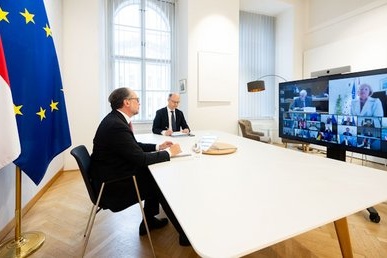Sponsored Content
Escalating Tensions: EU Responds to Iranian Missile Strikes on Israel
Tensions in the Middle East have further escalated following the recent Iranian drone and missile attacks on Israel, prompting an international response, particularly from the European Union. An urgently convened virtual meeting of EU foreign ministers, including Austria's Foreign Minister Alexander Schallenberg, took place to discuss the situation and possible steps to be taken.
 Austrian Foreign Minister Schallenberg discussed virtually the Middle East situation with his EU counterparts. / Picture: © BMEIA Bundesministerium für Europa, Integration und Äußeres / Gruber
Austrian Foreign Minister Schallenberg discussed virtually the Middle East situation with his EU counterparts. / Picture: © BMEIA Bundesministerium für Europa, Integration und Äußeres / Gruber
The Iranian attacks, which took place on Sunday night, involved around 300 missiles and drones, according to Israeli sources, most of which were intercepted by Israel's advanced defense system. This military confrontation marks a new level of escalation in an already tense regional environment.
The international response: condemnations and calls for…
or Log In
Fast News Search





